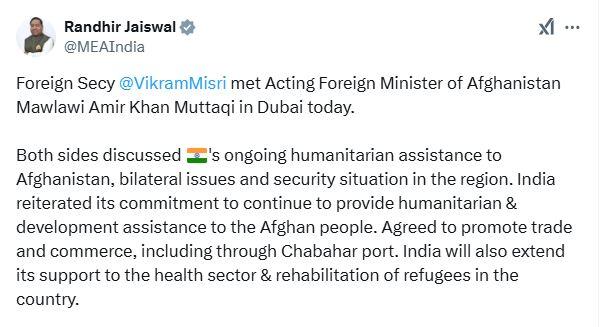For Afghanistan, India’s support represents a vital lifeline as it navigates complex domestic and regional challenges. The agreement to promote trade, enhance humanitarian aid, and address shared security concerns lays the groundwork for a more cooperative relationship.
In a significant diplomatic development, India has pledged to provide “material support” for the rehabilitation of returning Afghan refugees. The announcement came during a high-level meeting in Dubai on Wednesday, marking the first formal engagement between India and the Taliban-led interim government since the latter’s return to power in August 2021.
Indian Foreign Secretary Vikram Misri met with Afghanistan’s acting Foreign Minister Mawlawi Amir Khan Muttaqi to discuss bilateral ties, humanitarian aid, and regional cooperation. The meeting underscores India’s renewed commitment to addressing Afghanistan’s pressing challenges amidst ongoing geopolitical complexities.
Randhir Jaiswal, spokesperson of the Indian ministry of external affairs tweeted:
Foreign Secy @VikramMisri met Acting Foreign Minister of Afghanistan Mawlawi Amir Khan Muttaqi in Dubai today. Both sides discussed India’s ongoing humanitarian assistance to Afghanistan, bilateral issues and security situation in the region. India reiterated its commitment to continue to provide humanitarian & development assistance to the Afghan people. Agreed to promote trade and commerce, including through Chabahar port. India will also extend its support to the health sector and rehabilitation of refugees in the country.

Addressing Refugee Rehabilitation
A key outcome of the meeting was India’s decision to extend assistance for the rehabilitation of Afghan refugees. Since late 2023, approximately one million refugees have been repatriated to Afghanistan from Pakistan and Iran. To support this effort, the Taliban-led administration has started distributing land to returning families. India’s material aid will prioritise the health sector and broader rehabilitation initiatives.
The Indian Ministry of External Affairs stated: “In response to the request from the Afghan side, India will provide further material support in the first instance to the health sector and for the rehabilitation of refugees.”
India’s ongoing humanitarian assistance to Afghanistan has been extensive. Over the past few years, New Delhi has dispatched 50,000 metric tons of wheat, 300 tons of medicines, 27 tons of earthquake relief aid, 40,000 litres of pesticides, 100 million polio vaccine doses, 1.5 million doses of the COVID-19 vaccine, 11,000 hygiene kits for drug de-addiction programs, 500 winter clothing units, and 1.2 tons of stationery kits.
At the Dubai meeting, the two sides reviewed these efforts and discussed expanding India’s role in Afghanistan’s development. The Indian government signalled its willingness to engage in infrastructure and development projects in the near future.
Chabahar Port: A Gateway for Regional Trade
Another critical topic of discussion was the promotion of trade through Chabahar Port, located in southern Iran. Developed by India, the port serves as a strategic supply route for goods destined for Afghanistan, bypassing traditional trade routes that pass through Pakistan. Both sides agreed to enhance the use of Chabahar for commercial activities and humanitarian aid delivery.
India’s Foreign Secretary highlighted the port’s importance, stating, “Chabahar Port is a critical asset for strengthening trade ties and ensuring uninterrupted supply chains to Afghanistan.” Afghan officials also acknowledged India’s concerns over regional security and assured full cooperation.
Cultural and Sporting Ties
Beyond aid and trade, the meeting touched upon the cultural and sporting ties between the two nations. Cricket, a beloved sport in both countries, emerged as a potential avenue for deepening people-to-people connections. Discussions included plans to enhance sporting collaborations, particularly in cricket, which has gained immense popularity among Afghanistan’s youth.
Addressing Regional Security
Security concerns also featured prominently in the talks. The Afghan delegation reiterated its commitment to addressing India’s regional security sensitivities. The meeting occurred days after India condemned Pakistani airstrikes in Afghanistan’s Paktika province, which killed 46 civilians, including women and children. India’s Foreign Ministry strongly criticised the attacks, calling them a continuation of Islamabad’s “old practice” of blaming neighbours for internal failures.
A Historic Relationship Rekindled
Foreign Secretary Misri emphasised India’s historic friendship with Afghanistan and its cultural and civilizational ties. He noted, “India remains committed to supporting the Afghan people during these challenging times. Our shared history and strong people-to-people connections underscore the importance of our bilateral relationship.”
This meeting follows an earlier engagement in November 2024, when an Indian delegation visited Kabul to meet Afghanistan’s acting Defense Minister, Mullah Mohammad Yaqoob. These interactions highlight a cautious yet significant recalibration of India’s approach to engaging with the Taliban-led government.
India’s renewed commitment to Afghanistan’s stability and development comes at a crucial time for the war-torn nation. As international recognition of the Taliban-led administration remains limited, India’s engagement signals its readiness to address humanitarian needs while safeguarding its strategic interests.
For Afghanistan, India’s support represents a vital lifeline as it navigates complex domestic and regional challenges. The agreement to promote trade, enhance humanitarian aid, and address shared security concerns lays the groundwork for a more cooperative relationship.
Dubai — where India and Pakistan settle scores on the cricket field and India and Afghanistan settle ties off it. Dubai is now the venue for both, boundaries and diplomacy!

